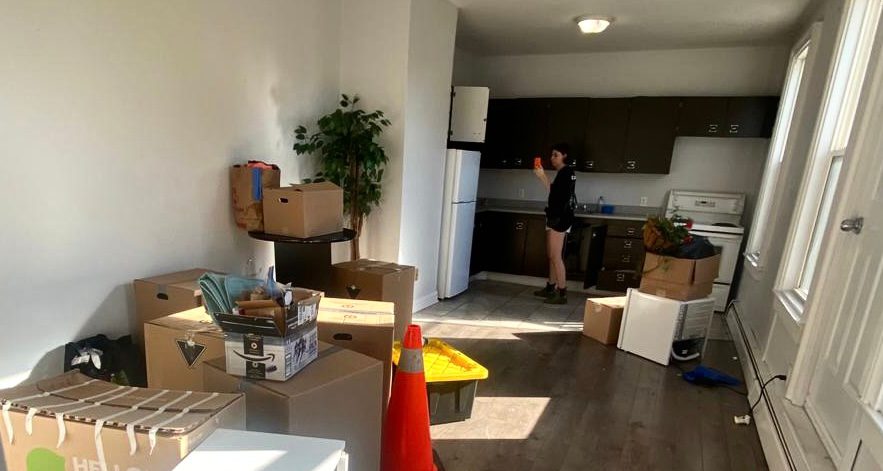Racialized Halifax residents face highest rate of core housing need in Canada: StatCan
Immigrant racialized people more likely to be in housing need than non-immigrants, says study

caption
A woman helps a tenant move into an apartment on Brunswick Street in Halifax.Shabab Nahian Kabir often has trouble getting a response from Halifax-area landlords when he’s looking for somewhere to live.
“Sometimes, I ask my white friends to call the landlords first. They schedule a booking and I go in,” said Shabab Nahian Kabir, a junior engineer originally from Yanbu, Saudi Arabia. “That’s how I get more replies,” said Nahian.
Facing discrimination in the Halifax housing market because of an accent or invasive questions about his immigration status is not uncommon for Nahian.
A Statistics Canada study released on Jan. 23 shed some light on how difficult it is for residents like Nahian to find housing in Halifax. The study, Housing conditions among racialized groups, found that Halifax has the highest rate, at 16.1 per cent, among cities in Canada for racialized groups living in core housing need. Related stories
Through data collected in the 2016 and 2021 censuses, the study determined which populations were in core housing need and which populations lived in a place owned by a household member.
If a household is in core housing need, it means it is not considered affordable (shelter costs less than 30 per cent of the total before-tax household income), adequate (is not in need of major repairs), or suitable (has enough bedrooms for the household), “and that would have to spend at least 30% of its total before-tax income on the median rent of another acceptable dwelling,” according to Statistics Canada.
The study also found that racialized immigrants are at higher risk of being in core housing need compared to non-immigrants.
For those who settled in Canada in the past decade, West Asian (22 per cent), Arab (22 per cent) and Chinese (19 per cent) racialized immigrants were most likely to be in core housing need.
On the other hand, the amount of racialized Canadians in core housing need as a whole is decreasing. In 2021, 11.3 per cent of racialized Canadians were in core household need, a 6.5 percentage point decline from the 2016 census.
“Finding housing was the most difficult thing. In other places where I have lived, like St. John’s, Toronto and Vancouver, I would just go in Kijiji,” said Nahian. “But in Halifax? It was not that easy.”
He said long waitlists and automated postings in Kijiji that weren’t real contributed to the three-week search for a place to live in Halifax.
However, once he moved in, he realized his new place was cramped and uncomfortable. “It took me a month or so to find a more permanent place,” said Nahian.
Anika Bushra sought a place in Halifax for more than a month.
“I texted around 100 people on Facebook and Kijiji combined,” said Bushra. Originally from Bangladesh, Bushra said that like Nahian, she also felt that landlords showed prejudice against her by, for example, asking questions about her culture before letting her look into leases.
“Four or five people asked me what kind of food I cook,” said Bushra. Landlords told her that they would be sensitive to any strong smell or spice, “so I should always be careful,” said Bushra.
Federal law has raised another barrier to finding housing. As of Jan. 1, a ban has been put in place by the federal government that forbids anyone who is not a Canadian citizen or permanent resident from buying residential propriety.
Had this law taken effect earlier, people like Mehreen Amin Saghani wouldn’t have been able to buy the two properties she currently owns and rents in Clayton Park. Originally from Pakistan, Saghani has been buying and renting houses for two and a half years.
Saghani said she found this ban illogical.
“You are investing your own savings and you are also paying a mortgage like any other person so I don’t think the government should have a problem with that,” she said. She said that in the future, she hopes to see more advocacy for landlords in Halifax.
Such bans concern the Immigrant Services Association of Nova Scotia. Nabiha Atallah, a strategic initiatives advisor for the association, said that Halifax benefits from immigrants.
“Immigrants bring opportunities, possibilities and richness,” she said.
Atallah said that Nova Scotia needs immigrants in order for the province to grow economically and demographically.
A spokesperson for provincial Housing Minister John Lohr said the government is aware that the housing crisis disproportionately affects people of colour.
In a statement, Krista Higdon said, “We know that racialized and marginalized individuals continue to experience systemic barriers when they try to access suitable, adequate, and affordable housing.”
Higdon said the government wants to support housing initiatives through programming.
“To improve the capacity of co-operatives and non-profit housing organizations and expand the number of affordable housing options for equity-seeking groups, the government has also committed $2.5 million to create a community housing growth fund,” said Higdon.
About the author
Natalia Tola
Natalia Tola was born and raised Ecuador. She is pursuing a four year Bachelor of Journalism (Honours) with a minor in Contemporary Studies....
